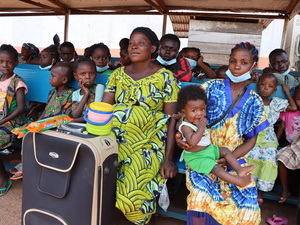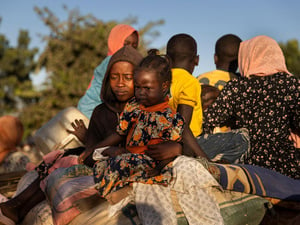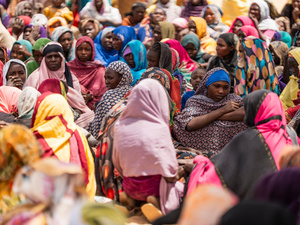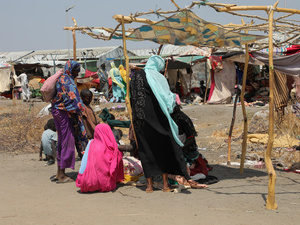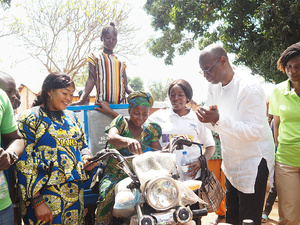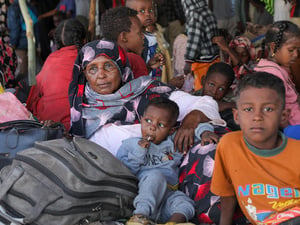UNHCR steps up aid to displaced in Central African Republic
UNHCR steps up aid to displaced in Central African Republic

Displaced people in the CAR capital Bangui find refuge in the unfinished church at St. Paul Parish after fleeing clashes.
BANGUI, Central African Republic, December 24 (UNHCR) - As inter-communal clashes continue in parts of the Central African Republic, the UN refugee agency is increasingly concerned about security and humanitarian problems in areas hosting the growing numbers of displaced people.
More than 710,000 people have been uprooted within the country since the current crisis started a year ago. This includes 214,000 internally displaced people in the capital Bangui. Many Christians have sought refuge in schools, churches and at the airport, while an estimated 35,000 displaced Muslims are mainly living with host families. A further 40,000 displaced people are in Bossangoa, 300 km north of Bangui.
While fighting between armed groups has been ongoing since last December, inter-communal clashes in Bangui erupted for the first time earlier this month.
Adelaide, a woman in her 60s, is among 17,000 people who have sought refuge in recent weeks at the Archeveché compound in Bangui. Carrying a bag with her belongings, she walked for two hours and could barely stand when she arrived last Saturday.
"I saw armed people, people I have never seen before at Kasai [on the eastern outskirts of Bangui]. When I heard gunshots, I decided to join the neighbours who were fleeing. On my way, I saw at least 15 dead people on the street," said Adelaide, wiping tears mixed with sweat rolling down her cheeks.
Lasare Kouassi Etien, UNHCR's Representative in the Central African Republic, said, "We have serious concerns over the prevailing humanitarian and security conditions in IDP sites and in host families. Some 60 per cent of the displaced population are children. More needs to be done in terms of assistance and protection."
UNHCR has already distributed tents, sleeping mats, plastic sheeting, mosquito nets, blankets and clothes to the displaced. But according to a recent assessment and protection monitoring in the IDP sites, the needs are still massive.
Security and access remain the top concerns, especially at the Bangui airport IDP site. "There is a complete disorder in this site. Young people are carrying grenades and machetes," said Kobin Omar Yalama, the Imam of Bangui.
"The tension is high," added Dieudonné Nzapalainga, Archbishop of Bangui. "I attempted to meet IDPs on this site without success."
Both of these senior religious leaders are now embarked on reconciliation campaigns in IDP sites and across the city.
UNHCR's Etien added, "We are working with all counterparts to ensure that the civilian character of all IDP sites is observed to allow secure access to the IDPs and to ensure their safety."
Living conditions in other IDP sites are inadequate. "We are more than 20 people in a single tent and others sleep outside in the open air," said Grace, a displaced mother holding her baby. "Those who sleep in churches have to evacuate them at 4 am to allow for preparation of the morning mass. Children fall sick because of the morning cold."
UNHCR's health partner, the International Medical Corps, has established health posts at the IDP sites. Between 200 and 250 displaced people are treated by nurses every day in the Archeveché compound. Most patients suffer from malaria and diarrheal diseases.
Under the inter-agency response to this crisis, UNHCR is leading the protection, shelter and non-food items clusters. To date, the agency has deployed an emergency team of 10 people to Bangui. An airlift operation is scheduled to bring in relief items by end of the year to replenish UNHCR's supplies in Bangui.
In addition to the massive internal displacement, the conflict has also driven Central Africans to flee to neighbouring countries. Since March, about 43,500 people have crossed into the Democratic Republic of the Congo, 12,000 into Chad, 11,000 into the Republic of Congo, and 5,000 into Cameroon.
By Bernard Ntwari in Bangui, Central African Republic

